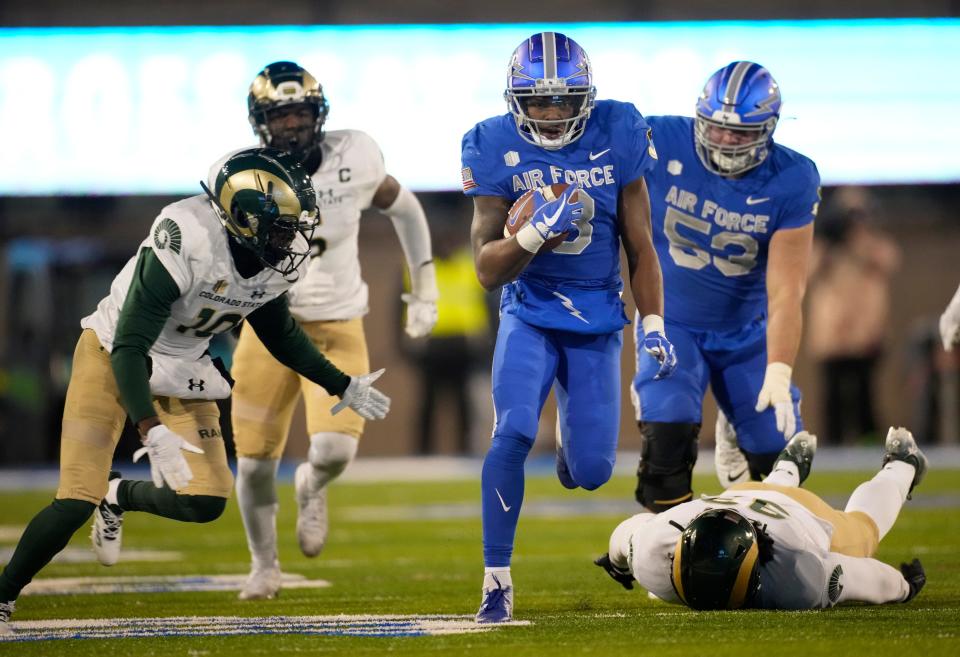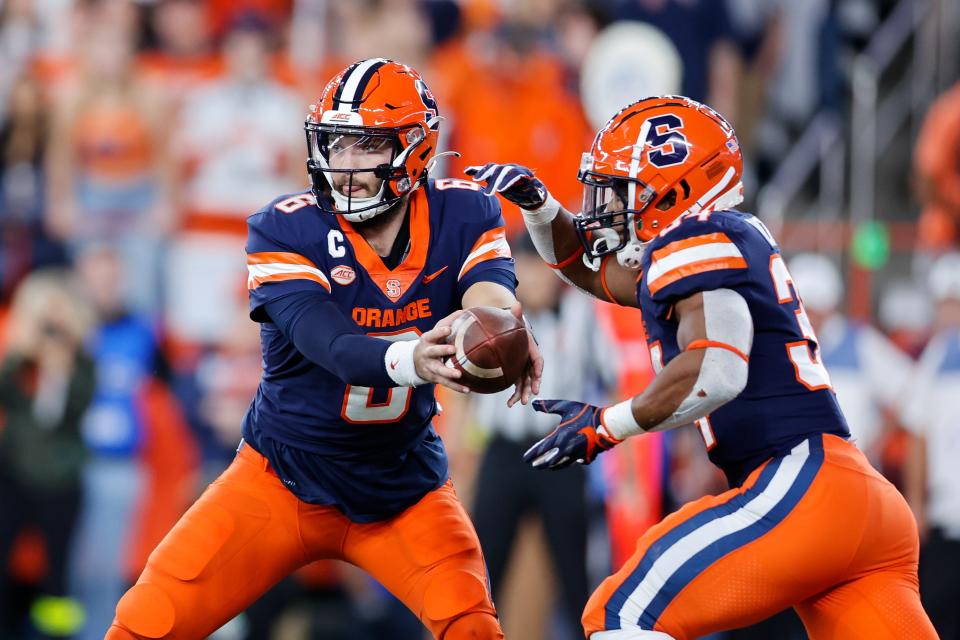All 41 college bowl games picked: How Air Force and Syracuse will help you win your office pool

Well, it's college football bowl season. Your office is having a pool and you're staring at the R&L Carriers New Orleans Bowl between Western Kentucky and South Alabama.
Let's see, you did go on the three-day party houseboat trip in Kentucky that one time, so you pick Western Kentucky.
Well, guess what. You're wrong. And furthermore, those days are over, because it's time once again for my still-unpatented "Quality Games" bowl-picking system. Eight years ago, I wanted to come up with a system that would take my stupid head and my gullible heart out of my bowl game picks.
How do you compare teams you haven't seen play, and who don't have common opponents? Yes there are games like Georgia Southern vs. Buffalo, but even games pitting big-conference schools like Iowa vs. Kentucky are almost impossible to pick.
Without my "Quality Games" system, I wouldn't have any clue who to pick. Here's how it works. I look at every game a team played this year and assign it a point total. Add up the 11 or 12 games the team played and that is their "Quality Games" score. The team in each matchup with the highest QG score is the pick.
And wins and losses aren't the only determining factor. A close loss to a ranked team is considered better than a narrow win over an unranked team. In baseball terms, it's like looking at a team's ERA, not their win-loss record. Put simply, how often does the team play a quality game when they step on the field?
So with that as the backdrop, I've run the numbers on all 41 games (82 teams, yikes). Here are the important findings followed by the pick for every game.
The scoring system
Here is a refresher of the value I assign to each game a team plays. I apply this to every game, add up their points and get their QG score.
3 points: Road win over a ranked team
2 points: Home/neutral win over a ranked team
1 point: Lopsided win (21 points or more) over an unranked team
1 point: Narrow loss (8 points or less) to a ranked team
0 points: Regular win (9-20 points) over an unranked team
0 points: Regular loss (9-20 points) to a ranked team
-1 point: Narrow win (8 points or less) over an unranked team
-1 point: Lopsided loss (21 or more) to a ranked team
-2 points: Regular loss to an unranked team (20 points or less)
-3 points: Lopsided loss to an unranked team (21 or more)
Important caveats: Some things to keep in mind. When referring to a "ranked" team, I'm using the end-of-the-year FBS top-25 rankings. You don't get extra credit for beating a team that was ranked at the time you beat them and isn't anymore. Also if you played a non-FBS school, the game doesn't count, unless you lost, and then it's -3. Also, this is just a straight numbers game based on teams' on-field performance so far, I'm not taking anything into account like a quarterback being injured, or key players choosing to skip bowl games or diving head-first into the transfer portal. You'll have to factor in those types of things as you see fit.
It's easier to understand if you see it in action, let's take a look at an example. Picking a random team that is in a bowl game this year, let's do the Texas Longhorns.
Game 1: A lopsided 52-10 win over Louisiana Monroe (1 point)
Game 2: A narrow 20-19 loss to currently ranked Alabama (1 point)
Game 3: A 41-20 home win over currently ranked UTSA (2 points)
Game 4: A 37-34 loss to unranked Texas Tech (-2 points)
Game 5: A regular (between 20-8 points) 38-20 win over West Virginia (0 points)
Game 6: A lopsided 49-0 win over unranked Oklahoma (1 point)
Game 7: A narrow 24-21 win over unranked Iowa State (-1 point)
Game 8: A 41-34 loss to unranked Oklahoma State (-2 points)
Game 9: A 34-27 road win at ranked Kansas State (a rare 3-pointer)
Game 10: A narrow 17-10 loss to ranked TCU (1 point)
Game 11: A lopsided 55-14 win over unranked Kansas (1 point)
Game 12: A regular 38-27 win over Baylor (0 points)
You can see how sometimes a win can be negative points and a loss can be positive points. Add all the points together and Texas has a QG (quality games) score of 5 points. Then I do the same for their opponent Washington and declare a winner. You can see how that turned out below.

The 10 games Vegas has wrong
The biggest value in the system is spotlighting games where you can gain an advantage over people in your picks league. Specifically, games in which the QG system sees the Vegas underdog as the favorite.
There are a whopping 10 such games this year. So if you are a believer in this system, pick these 10 underdog teams. Listed with QG score in parenthesis:
UTSA (-5) over Troy (-8) in the Cure Bowl
Washington State (2) over Fresno State (-3) in the Jimmy Kimmel L.A. Bowl
Air Force (-4) over Baylor (-7) in the Armed Forces Bowl
Middle Tennessee State (-9) over San Diego State (-11) in the Hawaii Bowl
New Mexico State (-14) over Bowling Green (-18) in the Quick Lane Bowl
Buffalo (-14) over Georgia Southern (-16) in the Camellia Bowl
Oklahoma State (-6) over Wisconsin (-11) in the Guaranteed Rate Bowl
UCF (-4) over Duke (-8) in the Military Bowl
Syracuse (-2) over Minnesota (-4) in the Pinstripe Bowl
Kentucky (-4) over Iowa (-6) in the Music City Bowl
Did the committee get the final four right?
It seems like every year, the Quality Games system likes three of the four committee picks and hates the fourth one. That was the case again this year. Georgia (15), Michigan (11) and Ohio State (11) are the three highest-scoring teams.
TCU, however, only scored five points in the QG system. That placed them in a tie for 10th. Instead, the QG would have installed Alabama as the fourth team. They scored 10 points.
The top QG teams are: Georgia (15), Michigan (11), Ohio State (11), Alabama (10), USC (9), Utah (9), Clemson (8), Tennessee (7) and Oregon (7)
So, based on the matchups, it will be a Georgia vs. Michigan final with Georgia winning, but expect the Georgia-Ohio State semifinal to be closer than the Michigan-TCU game.
The heavy favorites
Don't think twice. Circle these winners in black marker and don't look back. If you are in a confidence pool, make these your biggest point-total picks. The sure things. (Yes, I know the more I lay it on, the more I jinx these lopsided QG favorites.)
Oregon (7) over North Carolina (-7) in the Holiday Bowl
LSU (2) over Purdue (-12) in the Citrus Bowl
UAB (-7) over Miami Ohio (-18) in the Bahamas Bowl
USC (9) over Tulane (-1) in the Cotton Bowl
Memphis (-6) over Utah State (-15) in the First Responder Bowl
Florida State (5) over Oklahoma (-4) in the Cheez-It Bowl
UCLA (4) over Pitt (-4) in the Sun Bowl
Ohio (-8) over Wyoming (-16) in the Arizona Bowl
Too close to call
Five games — a record — ended up in a flat-footed tie when running them through the QG gauntlet. In those cases, I advise picking the Las Vegas underdog. Why not try to gain an edge on your opponents who are just picking Vegas winners when they aren't sure. So here is how to pick these toss-ups.
BYU (-8) over SMU (-8) in the New Mexico Bowl
Louisiana (-6) over Houston (-6) in the Independence Bowl
Washington (5) over Texas (5) in the Alamo Bowl
South Carolina (-3) over Notre Dame (-3) in the Gator Bowl
Mississippi State (-2) over Illinois (-2) in the ReliaQuest Bowl
All 41 bowl game winners
Here's what you've been waiting for, the winners and the QG scores (in parenthesis) for all 41 games in order of when they are played. The bigger the gap in the scores, the more confidence you should have in that pick if you're doing the type of pool that has confidence points. The winning team (or in the case of a tie, the team I suggest picking) is listed first.
Bahamas Bowl: UAB (-7) over Miami Ohio (-18)
Cure Bowl: UTSA (-5) over Troy (-8)
Fenway Bowl: Louisville (-3) over Cincinnati (-4)
Las Vegas Bowl: Oregon State (4) over Florida (-1)
L.A. Bowl: Washington State (2) over Fresno State (-3)
LendingTree Bowl: Southern Miss (-12) over Rice (-17)
New Mexico Bowl: BYU (-8) over SMU (-8) (tie)
Frisco Bowl: Boise State (-5) over North Texas (-9)
Myrtle Beach Bowl: Marshall (-5) over UConn (-12)
Idaho Potato Bowl: San Jose State (-7) over Eastern Michigan (-13)
Boca Raton Bowl: Toledo (-8) over Liberty (-15)
New Orleans Bowl: South Alabama (-1) over Western Kentucky (-4)
Armed Forces Bowl: Air Force (-4) over Baylor (-7)
Independence Bowl: Louisiana (-6) over Houston (-6) (tie)
Gasparilla Bowl: Wake Forest (-2) over Missouri (-4)
Hawaii Bowl: Middle Tennessee (-9) over San Diego State (-11)
Quick Lane Bowl: New Mexico State (-14) over Bowling Green (-18)
Camellia Bowl: Buffalo (-14) over Georgia Southern (-16)
First Responder Bowl: Memphis (-6) over Utah State (-15)
Birmingham Bowl: East Carolina (-8) over Coastal Carolina (-10)
Guaranteed Rate Bowl: Oklahoma State (-6) over Wisconsin (-11)
Military Bowl: UCF (-4) over Duke (-8)
Liberty Bowl: Arkansas (-6) over Kansas (-7)
Holiday Bowl: Oregon (7) over North Carolina (-7)
Texas Bowl: Mississippi (0) over Texas Tech (-5)
Pinstripe Bowl: Syracuse (-2) over Minnesota (-4)
Cheez-It Bowl: Florida State (5) over Oklahoma (-4)
Alamo Bowl: Washington (5) over Texas (5) (tie)
Duke's Mayo Bowl: Maryland (-4) over N.C. State (-6)
Sun Bowl: UCLA (4) over Pitt (-4)
Gator Bowl: South Carolina (-3) over Notre Dame (-3) (tie)
Arizona Bowl: Ohio (-8) over Wyoming (-16)
Orange Bowl: Clemson (8) over Tennessee (7)
Sugar Bowl: Alabama (10) over Kansas State (5)
Music City Bowl: Kentucky (-4) over Iowa (-6)
Fiesta Bowl: Michigan (11) over TCU (5)
Peach Bowl: Georgia (15) over Ohio State (11)
ReliaQuest Bowl: Mississippi State (-2) over Illinois (-2) (tie)
Citrus Bowl: LSU (2) over Purdue (-12)
Cotton Bowl: USC (9) over Tulane (-1)
Rose Bowl: Utah (9) over Penn State (5)
So there you have it, all 41 winners, including 15 games in which you should pick the Vegas underdog straight up. This system has had success. In the first four years I tried it in my confidence pool of about 25 guys, I finished first, second, first and second. Then I had two years where I finished eighth and ninth, so lost some luster, but last year, I finished second again. I just like going into it not flying blind. I feel like there is some substance behind this system even if it's not foolproof.
Good luck, have fun and as always, gamble responsibly.
Shad Powers is a columnist for The Desert Sun. Reach him at shad.powers@desertsun.com.

This article originally appeared on Palm Springs Desert Sun: College football bowl games: Picking all 41 winners using patented system

